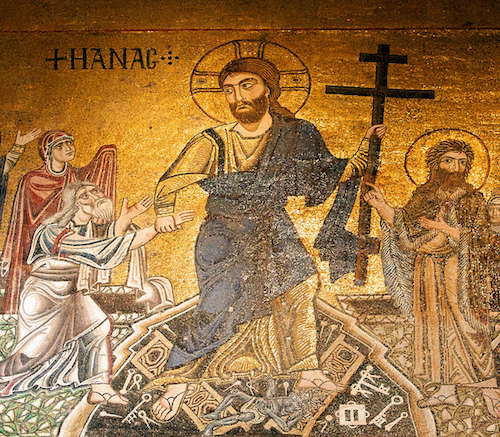We run our website the way we wished the whole internet worked: we provide high quality original content with no ads. We are funded solely by your direct support. Please consider supporting this project.

How the Anabaptists Emphasized the Cross
Because the Anabaptists have generally emphasized faith that is evidenced by works and thus on Jesus’ life as an example to be followed, it may prima facia appear that the saving work of the cross was less central to the early Anabaptists than it was to the Reformers and to Evangelicals. In reality, I would argue, this is not at all the case.
Given how persecuted the early Anabaptists were, it’s not surprising that they rarely discussed atonement theories in a formal way, let alone that they never embraced any particular theory. However, when Sattler, Hubmaier, Denck and other Anabaptist leaders did write and speak about the work of Christ on the cross, they actually reflect aspects of each of the major models of the atonement in Church history. Yet, in summing up their views, Thomas Finger observes that, “[a]mong traditional models … Christus Victor can be called historic Anabaptism’s primary expression of Jesus work.” This is true, however, only “providing we add that they experienced this as more present and participatory, and more specifically shaped by Jesus’ life than most.”[1]
In other words, the central emphasis tended to be on the manner in which Jesus’ humble, self-sacrificial life and death defeated forces of evil. Yet, this emphasis was not only regarding what Jesus did for us; it included what Jesus does in us and through us. To use Finger’s terminology, their Christus Victor model was not only “conflictive” but “transformative.”[2] Because they understood Jesus’ cruciform way of defeating the powers to be something they are called to participate in, they refused to engage in violence, even as an act of self-defense when persecuted and martyred by other Christian groups.
In this light, I would argue that, in a wholly informal way, the early Anabaptists tended to integrate Jesus’ death with every other aspect of his life, which is precisely the position I argue in Crucifixion of the Warrior God. And so, while one doesn’t typically find as strong a formal emphasis on the saving significance of the cross among them as one finds among the Reformers and Evangelicals, I would argue the cross was no less thematically central to them than it was to these others.
If anything, I would argue it is more central inasmuch as the Anabaptists understood the cross not only to be the thematic center of everything Jesus was about, but also as the thematic center of everything his followers are to be about. As is the case in the NT, the early Anabaptists generally understood that to follow the one who lived a cruciform life and died a cruciform death, one must be willing to adopt a cruciform lifestyle.
[1] T. Finger, A Contemporary Anabaptist Theology: Biblical, Historical, Constructive (Downers Grove, IL: IVP, 2006), 350.
[2] ibid., 341, 343
Photo credit: Nick in exsilio via Visual Hunt / CC BY-NC-SA
Category: General
Tags: Anabaptists, Christus Victor, Cross, Cruciform Theology, Jesus
Related Reading

Podcast: What Do We Do When the Bible Sends Mixed Messages?
Greg considers how to interpret mixed commands in the Bible—where one verse advises differently than another. http://traffic.libsyn.com/askgregboyd/Episode_0364.mp3

Can Bible Imperfections IMPROVE the Reliability of the Bible? (podcast)
Greg talks about his new book: Inspired Imperfection: How the Bible’s Problems Enhance Its Divine Authority. Episode 537 http://traffic.libsyn.com/askgregboyd/Episode_0537.mp3

Is the Jesus of Revelation Wrathful?
In the second coming of Jesus, will he turn with wrath? Will he come as a roaring lion, ready to put on his display all of his anger, power, and might? What does the Jesus revealed in Revelation look like? This is a short clip that addresses these questions. If you want to watch the…

Was Jesus Really Human Like the Rest of Us?
Did Jesus really live as a human like you and I do? Or did he walk around with special divine powers that we don’t have? In the previous post, I introduced the question: How was God both fully God and fully man? I explained the classical model of the Incarnation which views the incarnate Jesus…

A Cruciform Magic Eye
In this post I’d like to share the story of how I came upon the thesis I’m defending in the book I’ve been working on for the last four years entitled The Crucifixion of the Warrior God: A Cruciform Theological Interpretation of the Old Testament’s Violent Divine Portraits. It’s a much longer post than usual,…

Sin-Bearing God
On the cross, God became our sin, as Paul wrote: “God made him who had no sin to be sin for us” (2 Cor 5:21). However, God didn’t begin to be a sin-bearing God when Jesus walked the earth and hung on the cross. Rather he became Incarnate and bore our sins on the cross…
